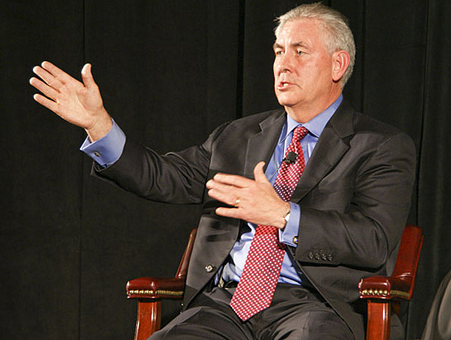
<a href="http://www.shutterstock.com/pic.mhtml?id=55388755">Repina Valeriya</a>/ Shutterstock
This story first appeared on the ProPublica website.
The last four months have been rather bumpy for Chesapeake Energy Corp., the nation’s second-largest natural gas company behind Exxon Mobil.
Starting in April, Reuters took aim at the company’s flamboyant chief executive, Aubrey McClendon, in a series of articles, prompting his ouster as company chairman (he remains CEO) last month at the behest of disgruntled shareholders. The revelations also triggered an SEC probe.
The company was rocked anew last week when the news agency disclosed a series of email exchanges in which McClendon and other Chesapeake executives appeared to collude with officials at EnCana Corp., Canada’s largest natural gas company, to suppress the price of land leases in Michigan.
Reuters reported on Monday that the Justice Department has launched a probe into whether these communications violated laws against price fixing.
As a prominent player in the national debate over hydraulic fracturing, Chesapeake was hardly a stranger to controversy even before the Reuters investigation. Last May, ProPublica reported that Chesapeake was fined more than $1 million by Pennsylvania state officials — the largest fine the state had issued to an oil and gas company — for contaminating water supplies in Bradford County.
The company’s business practices earlier came under criticism when it emerged in mid-2009 that Chesapeake’s board gave McClendon a $112.5 million pay package in 2008 even as the company’s stock dropped 58 percent amid slumping natural gas prices. The contract, which included a $75 million bonus and other generous perks, was brokered as McClendon staved off a personal financial crisis by selling off approximately $552 million worth of Chesapeake shares over a three-day stretch to cover margin calls.
Shareholders expressed their displeasure with the generous compensation package, the highest awarded to any Fortune 500 CEO in 2008, by suing Chesapeake. In 2011, as part of a settlement, McClendon agreed to buy back a collection of antique maps sold to the company for $12 million under the 2008 plan. Today, the 52-year-old, who owns a 19 percent stake in the NBA’s Oklahoma City Thunder, has an estimated net worth of $1.1 billion.
Here are some of the key findings from the recent Reuters series:
- McClendon failed to disclose up to $1.1 billion in personal loans borrowed against his share of company oil and gas wells under a unique company program that gave the former chairman a 2.5 percent stake in the profits of thousands of drilled wells. The program has since been dropped. (First indication of the loans came in a story by the Pittsburgh Post-Gazette, which reported in March that a Chesapeake affiliate run by McClendon was mortgaging its stake in oil and gas leases in West Virginia.)
- For a time, McClendon operated a $200 million hedge fund that traded in oil and gas contracts. Experts have called this problematic since insider knowledge that McClendon gained as head of Chesapeake could have helped boost his personal profits at the expense of the company. Tom Ward, Chesapeake’s co-founder and McClendon’s hedge fund partner, has denied there was a conflict of interest. “We did not use any proprietary knowledge of (Chesapeake) trades to make our own individual decisions,” he told Reuters. Forbes has more on the potential breach of duty created by the fund, the existence of which wasn’t disclosed to shareholders.
- According to Reuters, top officials at Chesapeake and EnCana exchanged emails between June and October 2010, discussing ways to avoid bidding against each other at a Michigan public land auction in order to keep land prices down. The emails discussed dividing up counties to acquire land without competing against each other. McClendon, according to the story, wrote in an email to a subordinate that it was time “to smoke a peace pipe” with EnCana executives “if we are bidding each other up.”
Reuters reported that it was unclear whether the rival energy giants “consummated any collusive agreements,” but an analysis of the auction results showed that “neither company bought any land in the same county as the other.”
A spokesman for Chesapeake had no comment regarding Reuters’ findings or the reports about the Justice Department investigation. A Justice Department spokesman declined to comment on the findings. In a June 25 press release, EnCana officials stated that an investigation into the collusion matter had been “immediately initiated.”
In the event of criminal prosecution, the potential consequences are substantial. Under the Sherman Antitrust Act, price fixing is a felony, punishable by fines of up to $100 million for companies and $1 million for company officials.
The scrutiny of Chesapeake’s corporate practices comes during a prolonged slide in natural gas prices, which reached their lowest levels in a decade in April. Chesapeake has a projected cash flow shortfall this year surpassing $10 billion.
The spotlight on the company isn’t going away: on Monday, Bloomberg reported that over its 23-year history, Chesapeake had paid just $53 million in income taxes on $5.5 billion in pretax profits, a rate of about 1 percent, thanks to a rule that allows U.S. oil and gas producers to postpone payments to account for the inherent costs of well drilling.












